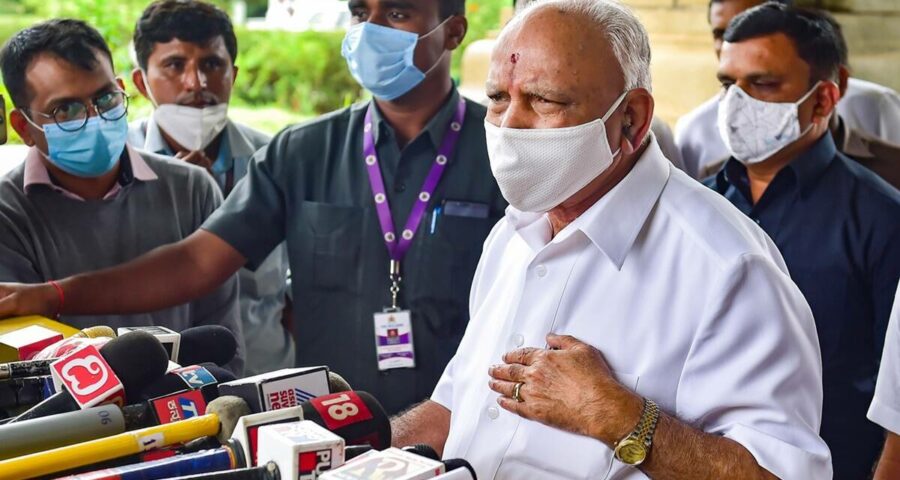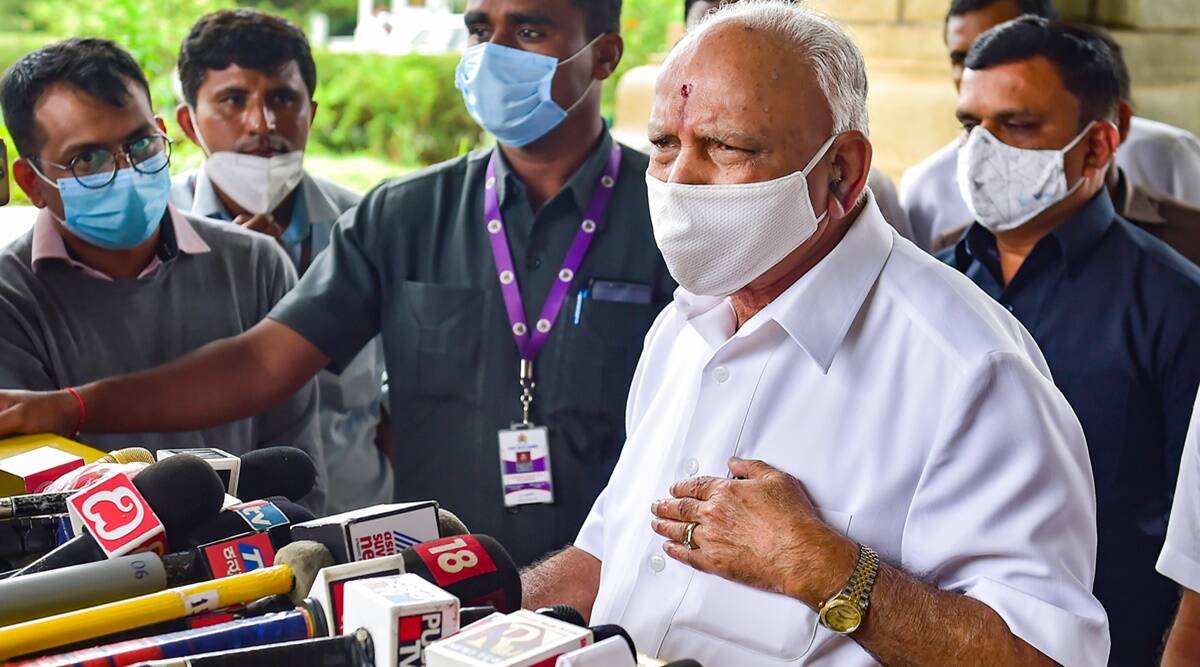Party leaders indicated that “the leadership will consider Yediyurappa's preferences” while choosing his successor. Union minister Dharmendra Pradhan will be the party's central observer to oversee the election of the new leader.
Weeks after the Union Cabinet reshuffle signalled a generational change in the BJP, the party on Monday managed to effect a transition in Karnataka, with B S Yediyurappa stepping down as chief minister and leaving the succession race wide open.
With memories intact of 2012 — when the Lingayat heavyweight had walked out of the party, wrecking the BJP’s political fortunes in the state — this time, the BJP leadership is treading carefully as it looks for a candidate who can lead the party into the next election in 2023, aware that it can only do so with the 78-year-old veteran’s blessings.
Party leaders indicated that “the leadership will consider Yediyurappa’s preferences” while choosing his successor. Union minister Dharmendra Pradhan will be the party’s central observer to oversee the election of the new leader.
“We have to assess the tone and mood before finalising a successor. The party will send an observer for the election of the new leader, who will be chosen this week. The decision will be taken after discussions at both the central and state levels,” said a top leader of the BJP.
Party leaders were divided in their responses when asked if the new CM would be from the Lingayat community.
One leader pointed out that Yediyurappa, who wants to “accommodate his son B Y Vijayendra before quitting”, is keen on retaining the Lingayat leadership within his family, and hence, could opt for a non-Lingayat leader. “But the party is moving cautiously because we don’t want to upset the Lingayats who form a major part of our support base,” the leader said.
In 2012, after Yediyurappa quit the BJP, he had formed the Karnataka Janata Paksha, which pushed the BJP into third position in the 2013 Assembly elections.
While many names of potential CM candidates are doing the rounds, including that of Murugesh Nirani, the Mining Minister in the Yediyurappa Cabinet and a Lingayat face, a name that has generated considerable buzz in the national capital is that of Union Parliamentary Affairs Minister Pralhad Joshi. Not a Lingayat leader, Joshi, sources said, may not be opposed by Yediyurappa.
Despite his advancing age, Yediyurappa — a leader who grew in national stature in the pre-Narendra Modi-Amit Shah era and for whom the party set aside its 75-years age bar — is not someone whom the party can ignore even after he ceases to be CM, pointed out a senior BJP leader who is familiar with the developments in Karnataka.
Which is why, unlike in 2011, when the party sent a battery of central leaders to ask him to resign as his name got embroiled in an illegal mining case, this time, the BJP central leadership did not make any comments against Yediyurappa nor did it send any leader to the state on the day he announced his resignation. In fact, both Arun Singh, general secretary in charge of Karnataka, and BJP president J P Nadda kept saying Yediyurappa was doing a “good job”.
Perhaps the last of the BJP chief ministers who did not need to piggyback on either Hindutva politics or Modi’s charisma to win an election, Yediyurappa has always been a factor in the BJP’s success in the southern state. In fact, the BJP’s fortunes in the states have closely mirrored the rise and fall of Yediyurappa in the party.
Unlike many other leaders of the present BJP, Yediyurappa was never a Hindutva poster boy. Instead, he was primarily a farmer leader who managed to get his support base aligned with the cultural and nationalist ethos of the BJP. Under him, the BJP witnessed a steady growth in the state amidst the upheaval in the politics of the Janata Dal and Congress.
“Yediyurappa took the BJP from urban areas to the villages. He played a role in crafting a pole away from the Congress and helped in stabilising that pole,” senior BJP leader P Muralidhar Rao, who was earlier in charge of Karnataka, told The Indian Express.
Yet, party leaders said that with elections two years later, the decision to replace him with a fresh face is a “good political move” because, as a senior leader said, “Yediyurappa cannot lead the party into another election after two years. The party cannot afford to go to polls with a new CM face after having Yediyurappa for four years. This is the right time for change and to prepare the party for the post-2023 period,” said a senior party leader.
However, the latest developments in the state, especially the protests by Lingayat leaders against removing Yediyurappa, haven’t gone down well with the BJP leadership. Though Yediyurappa himself appealed to his protesting supporters, a section in the central leadership believes the protests may have been “stage-managed.” “The BJP would not like to be held to ransom by anyone whoever that may be,” said a senior party leader.
Source: Read Full Article


